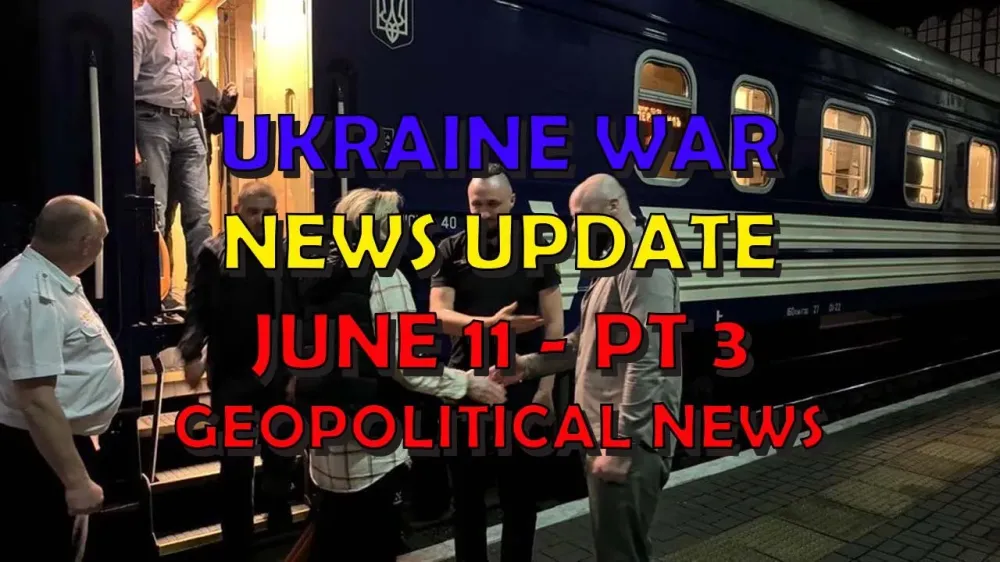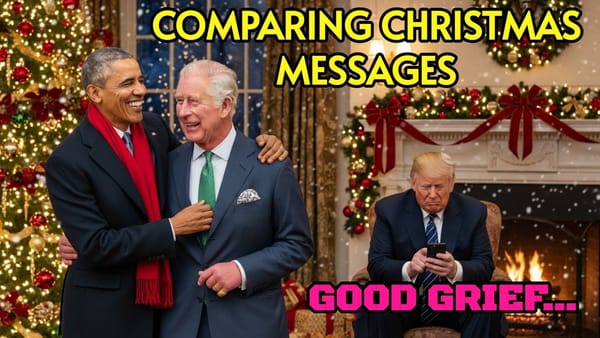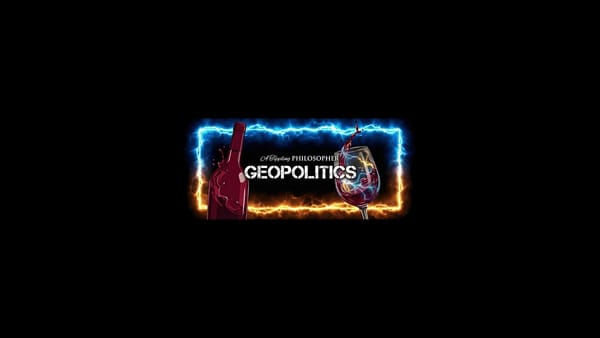Ukraine War Update NEWS: Geopolitics News
Table of Contents 📖
"Why are we treated like this?"
Hello Team
🎦 00:00-00:22⏩
Jonathan welcomes viewers to another ATP Geopolitics update focusing on the geopolitical aspects of the Ukraine war, picking up from his previous video covering previous news. He's ready to dive into the day's content.
Return to top⤴️
Far-right Support in Ukraine vs. Europe
🎦 00:22-04:02⏩
Jonathan addresses a comment from "Kate from Kharkiv" highlighting the hypocrisy of European accusations regarding far-right influence in Ukraine. He points out that Ukraine has a significantly lower percentage of votes for far-right parties than most European countries. Jonathan emphasizes that this Russian narrative is demonstrably false, with far-right representation in the Ukrainian parliament nonexistent and accounting for less than 3% of the vote. In contrast, many European nations see far-right support exceeding 15%. He expresses frustration at the blatant double standard and urges Europeans to examine their own countries before levelling accusations at Ukraine.
Return to top⤴️
Zelensky's Bundestag Speech and German Support
🎦 04:02-04:58⏩
Jonathan discusses Zelensky's visit to Germany, where he attended the Ukraine Recovery Conference and addressed the Bundestag. He notes positive responses from figures like Olaf Scholz and Mark Rutte, alongside a "long-lasting standing ovation" from the German parliament, highlighting mainstream support for Zelensky. However, he criticises the pro-Russian right-wing AfD and left-wing BSW parties for boycotting the speech, interpreting their actions as aligning themselves with Russia and validating criticisms against them. He specifically calls out the former Linker politician, Sara Wagenknecht, now leading the BSW, for her pro-Russian stance.
Return to top⤴️
EU Accession Talks and the Rise of the Far-Right
🎦 04:58-10:11⏩
Jonathan discusses Ursula von der Leyen's belief that the EU should commence accession talks with Ukraine in June. He speculates on her motivations, suggesting that the recent surge of the far-right in EU elections may factor into her timing. Jonathan details a previous argument about the extent of this surge and clarifies that while the number of far-right seats might not appear significant, the ideological shift within existing right-wing groups like the ECR towards a more extreme position is concerning. He draws a parallel with the UK Conservative Party's shift to the right over the last decade, driven by pressure from figures like Kemi Badenoch, Suella Braverman, Priti Patel, and Jacob Rees-Mogg. Jonathan argues that this polarization is occurring across Europe and the US, likening it to the influence of MAGA Republicans on the US Republican Party.
Return to top⤴️
Left-Wing Pro-Russia Sentiment and Irish MEPs
🎦 10:11-11:19⏩
Jonathan shifts focus to pro-Russian sentiment within the far-left, citing the example of Irish MEPs Mick Wallace and Clare Daly, who lost their seats in the recent European Parliament elections. He criticises their simplistic "anti-US imperialism" stance, which leads them to support China and Russia by default instead of engaging in more nuanced criticism. Jonathan welcomes their departure from the European Parliament.
Return to top⤴️
Czech Arson Attack and Russian Involvement
🎦 11:19-12:52⏩
Jonathan covers a failed arson attack in Prague, which Czech Prime Minister Petr Fiala has linked to Russia. He ties this incident to previous discussions about the use of fire as a tool of disruption, referencing both Ukrainian actions within Russia and Russian attempts to instigate fires in Europe. He mentions the burning down of Poland's largest shopping mall as a potential example, expressing his longstanding concern about such tactics. Jonathan explains the significance of intelligence terms like "very likely", which indicate a high degree of certainty based on analysis.
Return to top⤴️
Poland-Belarus Border Buffer Zone
🎦 12:52-14:33⏩
Jonathan reports on the creation of a buffer zone on the Poland-Belarus border, highlighting the unprecedented nature of such a measure within Europe. Polish Prime Minister Donald Tusk announced the move following a Security Council meeting, prompted by the death of a Polish border guard, Mateusz, in a clash with migrants allegedly encouraged by Belarus. Jonathan connects this incident to previous claims of Belarus instigating migrant issues along its borders with Poland and the Baltic states, as well as similar accusations levelled at Russia by Finland.
Return to top⤴️
Poland and US Launch Disinformation Taskforce
🎦 14:33-15:39⏩
Jonathan expresses relief at the long overdue launch of a joint US-Poland task force to combat Russian disinformation about the war in Ukraine. The group, comprised of representatives from various Western countries, NATO, and the EU, will be based in Warsaw. Jonathan highlights the urgent need for this initiative, given the pervasive nature of Russian propaganda and its impact on public opinion. He emphasizes the frustrating pervasiveness of disinformation on social media.
Return to top⤴️
Cryptic Message from Ukraine's Kamishin
🎦 15:39-16:54⏩
Jonathan discusses a cryptic message from Oleksandr Kamishin, Ukraine's Minister of Strategic Industries, following a surprise visit from Dutch Defence Minister Kajsa Ollongren. Kamishin hinted at significant developments, stating that "things are cooking" and an announcement is imminent. Jonathan speculates about what this could entail, suggesting possibilities like air defense systems, aircraft, or military instructors being deployed within Ukraine. He praises the Netherlands for its unwavering support of Ukraine.
Return to top⤴️
Bucharest Nine Consider Excluding Hungary
🎦 16:54-19:52⏩
Jonathan reveals that the Bucharest Nine (B9), a group of Central and Eastern European NATO allies, are considering excluding Hungary from future meetings due to its stance on the war. He reiterates his view of Viktor Orbán's Hungary as a problem for both the EU and NATO, highlighting the delicate balance between engaging with Orbán and risking pushing Hungary further into Russia's sphere of influence. Jonathan analyses the constraints on Hungary due to its reliance on EU funding and the potential consequences of being ousted from NATO. He cites the recent success of opposition leader Péter Márki-Zay in the EU elections, where he garnered 30% of the vote while Orbán's Fidesz party saw their lowest numbers yet, as a sign that Orbán needs to reassess his approach. Jonathan argues that Hungary's reliance on the EU and the potential loss of military support should make aligning with Russia unattractive. He concludes that Hungary's problematic positioning is becoming increasingly clear to other nations.
Return to top⤴️
The Benefits and Misunderstandings of NATO
🎦 19:52-23:56⏩
Jonathan transitions to discussing the benefits of NATO, referencing a previous video by the YouTuber "Perun" on this topic. He addresses the argument that European nations need to contribute more to their defense, acknowledging its validity but emphasizing the strategic advantages the US gains from its leading role in NATO. Jonathan challenges the notion that NATO membership requires direct financial contributions, explaining that the focus is on individual nations meeting defense spending targets. He criticizes a recent vote by a fifth of US House Republicans, led by Marjorie Taylor Greene, to defund NATO, arguing that it demonstrates a fundamental misunderstanding of the alliance and its benefits. Jonathan expresses his frustration with Greene's stance, suggesting it undermines American influence and prosperity while contradicting the "Make America Great Again" slogan. He quotes former US Army General Barry McCaffrey and General Ben Hodges, who argue that NATO is crucial for deterrence and peace, with the US benefiting significantly from European prosperity and stability. Jonathan concludes by emphasizing that NATO membership requires just 100,000 US troops stationed in Europe, a small price to pay for the security and economic benefits it provides.
Return to top⤴️
St. Petersburg Economic Forum and Russian Isolation
🎦 23:56-26:15⏩
Jonathan discusses the recent St. Petersburg International Economic Forum, an annual event intended to showcase Russia's economic potential. He notes the declining international participation, with no major contracts signed for the second year running. Jonathan compares this to a struggling lemonade stand, suggesting that Russia's offerings are either unattractive or its reputation as a "mass murderer" is deterring potential partners.
Return to top⤴️
Moldova Detains Suspected Russian Propagandists
🎦 26:15-26:15⏩
Jonathan briefly touches upon the detention of passengers arriving in Chisinau, Moldova, from Russia. Moldovan police suspect these individuals, allegedly returning from the St. Petersburg Economic Forum, of being Russian agents.
Return to top⤴️
Gazprom's Struggles and Dependence on Central Asia
🎦 26:15-28:42⏩
Jonathan analyzes Gazprom's attempts to secure new gas contracts with Uzbekistan and Kyrgyzstan, highlighting the company's desperation in light of Western sanctions. He notes the long-term nature of the deals (until 2040) and the low prices being offered, indicating a need to offload gas that other markets are refusing. Jonathan details Gazprom's plans to utilize and expand existing Soviet-era pipelines in Central Asia to facilitate these exports, emphasizing the company's reliance on aging and potentially unreliable infrastructure. He provides figures on projected gas volumes and prices, noting that while any profitable sale is welcome for Gazprom, these deals are unlikely to offset the company's losses. Jonathan attributes Gazprom's declining market value, from $200 billion to $29 billion, to the impact of sanctions and the war.
Return to top⤴️
Iran's Shadowy Oil Trade and Russian Parallels
🎦 28:42-30:30⏩
Jonathan shifts focus to Iran's growing oil exports despite sanctions, drawing parallels with Russia's shadowy practices. He cites TankerTrackers.com data indicating a doubling of ship-to-ship oil transfers in the Strait of Hormuz, highlighting the methods used to circumvent sanctions. Jonathan compares the difficulties of transporting gas, which requires complex infrastructure for liquefaction and pipeline networks, to the relative ease of transporting oil. He notes that while Russia faces challenges in quickly establishing the necessary infrastructure for large-scale gas exports under sanctions, oil can be moved more easily through illicit means like clandestine ship transfers.
Return to top⤴️
Russian Tourists Targeted in Turkey
🎦 30:30-33:20⏩
Jonathan shares a story about Russian tourists in Turkey who had their belongings defaced with faeces after hanging a Russian flag outside their hotel room. He expresses amusement at the incident, suggesting that the tourists' naive surprise at the negative reaction highlights a lack of awareness regarding global perceptions of Russia's actions. Jonathan humorously analyzes the tourists' questions about why they are being treated poorly, sarcastically implying that supporting a genocidal regime might be a contributing factor.
Return to top⤴️
Wrap up
🎦 33:20-33:58⏩
Jonathan thanks his viewers for watching and encourages them to like, subscribe, and share the video. He expresses gratitude for the support of his members and those who contribute financially via platforms like "Buy Me a Coffee" and PayPal. Jonathan provides a brief update on a potential fundraising initiative for a NAFO truck in collaboration with JR, Professor Girdis, and Greg Terry, stating that while plans are in the early stages and not yet finalized, it looks promising. He signs off by saying he will keep his audience updated on the project.
Return to top⤴️



